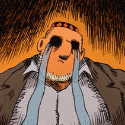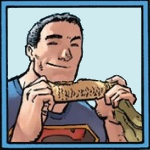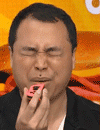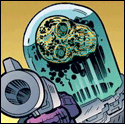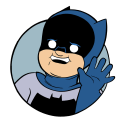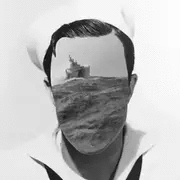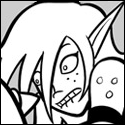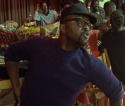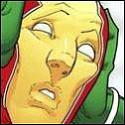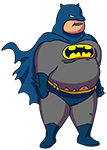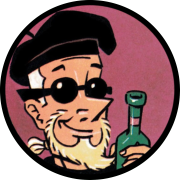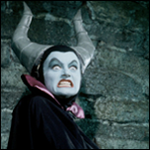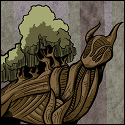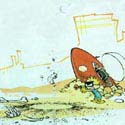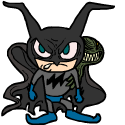|
I recently reread the Seven Soldiers megaseries for the first time in several years. Even though it's existed in its complete form for a minute, after reading the whole thing again, I feel an insuperable compulsion to talk about it. Here you come in. Seven Soldiers? Buh…? For all zero of you who don't know, in 2005-2006, Grant Morrison wrote a megaseries called Seven Soldiers of Victory, an all-new, all-different revival of a Silver Age team. Allow me to explain the premise… Throughout history, humans have told legends of faeries, changelings, and other malicious little shapeshifters who use humans for their own selfish ends. As it turns out, these legends all have their roots in the Sheeda, a race of faerie changelings who literally feed off of old civilizations. The Sheeda live on Earth about a billion years in the future. Periodically (and by "periodically" I mean approximately once an epoch), the Sheeda come back to the past, and in an event known as the Harrowing, nearly annihilate the entire planet, stripping it of people, culture, and even emotions, intentionally leaving just enough for humanity to rebuild itself for another Harrowing in its far future. A prophecy foretells that seven heroes will stop the Sheeda forever. For this reason, the Sheeda specifically hunts and destroys teams of seven. Over the millennia, a number of teams of seven tried and failed to stop the Harrowing—and the Sheeda. (More on the failed teams later.) As one last line of defense, seven superheroes from around—and in some cases, before and inside—the world will band together to put an end to the Sheeda once and for all: Shining Knight, Manhattan Guardian, Klarion, Zatanna, Mister Miracle, Bulleteer, Frankenstein. This time, they have an advantage: they've neither met nor even know about each other! The arc spans seven four-issue limited series with two "bookend" issues for the entire arc. If you want a list of the issues… Seven Soldiers #0 (start) Shining Knight #1-4 Manhattan Guardian #1-4 Klarion #1-4 Zatanna #1-4 Mister Miracle #1-4 Bulleteer #1-4 Frankenstein #1-4 Seven Soldiers #1 (end) For a more detailed reading order…  You can buy the whole thing in trade form… Volume 1 Volume 2 Volume 3 Volume 4 (The first two trades also have ComiXology and Kindle editions.) If you don't feel like plunking down Bookend Issues Shining Knight Manhattan Guardian Klarion Zatanna Mister Miracle Bulleteer Frankenstein For some optional additional materials, check out Justice League of America #100-102, which tells the story most relevant to this arc. You can find it collected in Crisis on Multiple Earths vol. 3. You can find a bit of foreshadowing starring one of the main antagonists, Qwewq/Nebula Man/Neh-Buh-Loh, in JLA: Classified#1-3. Nobody hates dogmatism more than me, and I won't waste too much of your time gushing, but I honestly consider this arc amongst the best comics ever written and probably the best I've ever read. I'd call it required reading for any fan of superhero funnybooks. The eight pencilers on the project each bring their own styles to the table—and all brought their A-games—and the result has a breadth and complexity that I can't remember the last time I've seen anywhere. The mini-series each serve well as standalone stories, but they weave together in an exquisitely complex way if you read them all. Actions in one will have consequences in another, and a plenitude of minor characters have arcs of their own that float through the books. Each book has a different art style (and J.H. Williams III brings a deft, mimetic style to the two bookend issue), but the character designs feel fresh and dynamic and the art has a liveliness that suffuses every issue. Anyway, since I just finished reading the series, I want to talk about it as a whole. In past BSS threads, discussion has gone issue-by-issue. You can talk about whatever you want, but I find the threads weaving through the entire story infinitely more fascinating, so I want to talk about the entire thing from a bird's-eye view. I'll use spoilers freely as we go, since I don't see how I could really get into the meat of this book without doing so. I'll begin in the logical place with… The Heroes Shining Knight  As the first of the soldiers we see, Shining Knight represents our cultural quintessence of a hero: a "pure" knight-errant in shining armor who rides to battle on a winged horse wielding Excalibur. Sir Justin/Ystin here hails from an age when real men would ride into battle on a mighty steed and return with riches, honor, and glory. Women existed to fawn over these men and have their kids. Morrison then turns the idea on its head by revealing Justin as Justina, a girl who conceals both her sex and her love for her colleague, Sir Galahad. In so doing, Morrison takes our idea of an "Ur-hero" and makes her a queer-positive symbol of social progress. (He also ties Justina's legend into a sort of monomyth by taking a page from Mulan.) Despite this inversion, Shining Knight's series still has the most straightforward arc of the seven series: she tries to kill the Sheeda queen and main antagonist Gloriana Tenebrae. Failing in this, she lands in present day Los Angeles, where she fends off the Sheeda's demons and gathers allies for another, more decisive assault. Justina's plot also has shades of a revenge tale, as Justina seeks to avenge Camelot, which the Sheeda practically destroyed in a Harrowing in times past. The finale gives Justina's straightforward story an ironic twist. As it turns out, Justina loses her final battle with Gloriana, but Justina nevertheless cripples Gloriana enough to manipulate Gloriana into her ultimate death. In Justina's emerging cognizance of her role in a bigger story, she still acknowledges this as a victory. We also see closure in Justina's character arc: she has gained self-confidence and comfort in her own skin. For her, Gloriana represents the guilt and shame she feels as a survivor and as a woman. In physically defeating her nemesis, Justina comes to terms with her femininity. The Shining Knight also ties in closest to the original soldiers, as Morrison based her on Flessel's Shining Knight, one of the original Seven Soldiers. Manhattan Guardian  Of all the soldiers, the Manhattan Guardian has the fewest superpowers in what comic fans would consider the conventional sense. Jake Jordan gets by on little more than Kevlar and courage. Morrison based him on the Guardian, and both carry shades of Captain America (e.g. no superpowers, insane levels of courage, indestructible shield). The Manhattan Guardian serves as the series' version of a "hero on the ground," a sort of beat cop who fights to better his community. His struggles deal with aspects of Manhattan taken to a dangerous extreme: landlubber pirates who fight in trains beneath the city and museum animatronics running amok. His story arc brings him into a struggle to restore his manhood and his heart. Throughout most of his arc, he believes he has to choose between life as a hero and his relationship with Carla (the classic cop-movie dilemma: you can have your job or your spouse, but not both). He eventually finds a way to both embrace his role as a hero—rescuing Billy Beezer, saving his boss's life, and defeating the Sheeda in New York City—and get the girl. Klarion  Like all good stories, Morrison built Klarion's story around an archetype: Klarion's inability to fit in with the repressive, regressive community in which he has grown up. Limbo Town practically takes its name from Klarion's feelings of ambition outgrowing his inanition. Klarion lives in the hope of seeing Blue Rafters (or as we call it, our lives). The events of the story imply that Limbo Town exists in an ontological paradox: the denizens of Limbo Town will, over the next few millions of years, become the Sheeda. A billion years from now, the Sheeda king, Melmoth, will travel back in time and corrupt the Cauldron of Rebirth, using it on the people of the Roanoke colony to create Limbo Town… who will become the Sheeda. As a result of all of this, Klarion serves as the hero who has the most "villain" in him, a human of Sheeda blood. Like many of the other heroes, Klarion finds himself in a different group of seven, seven street-thieving adolescents who teach him to take what he wants. They push his story arc into evil territory, giving him the agency and confidence he needs to take power for himself. The Klarion we see here will one day become the Klarion of Etrigan fame. In the finale, Klarion takes over the remaining vestiges of the Sheeda, going back in time and emerging as a supervillain who would torment Etrigan for years to come. In this way, the paradox that made his people will exist in microcosm within Klarion himself. Zatanna  Despite her illustrious past as a member of the Justice League, Zatanna Zatara looks at her heroic life only as a long string of failures. Zatanna has the most "internal" struggle of the soldiers, coming to terms with having to fill the shoes of her father, Giovanni "John" Zatara, a Golden Age hero who died a hero's death during the Crisis on Infinite Earths. As with several of the other soldiers, Zatanna unwittingly involved herself in a failed team of seven. In her case, she unwittingly had them killed by summoning Gwydion, a "Merlin sprite" who immolated them. This, combined with her part in mindwiping Batman in the past, has pushed her guilt to the point where she believes she's lost her powers. Zatanna's arc plays out in a manner similar to L. Frank Baum's Wizard of Oz. She gradually discovers that, unbeknownst to herself, she has had the power all along. This resurgence of self-belief drives her to utter the spell, "NEVES SREIDLOS EKIRTS," the last "push" needed to retroactively put all the events in place to finally stop the Sheeda. Zatanna comes full-circle in her own way as well, becoming a mentor to Misty Kilgore (probably named after Misty Lee), carrying on her father's legacy in her own way. In realizing this, she had to "kill her father" in the personage of Zor, a renegade member of the Seven Unknown Men who wears Zatara's face and clothes in perverse mockery. Mister Miracle  In this series, Shilo Norman—who first appeared as Scott Free's protege in Kirby's Fourth World—has taken up the mantle of Mister Miracle, performing as a celebrity escapologist. Of all the miniseries, Mister Miracle's series probably feeds most into Morrison's reputation for confusing, convoluted, inscrutable stories. Mister Miracle can escape any kind of physical trap, but this series puts him in a whole 'nother kind: a Life Trap. Mister Miracle finds himself in an alternate dimension where he continues reliving simulated "lives" designed to whittle down his will and break him to the service of Dark Side (Darkseid's physical manifestation in this trap). Eventually, Mister Miracle discovers that the key to escape lies in his Motherboxxx, which eventually becomes a literal part of him that allows him to escape death itself. Although his story appears completely isolated and self-contained at first glance, Mister Miracle does his part for the soldiers by freeing Oracle/Aurakles, the first superhero and another of the movers-and-shakers behind the scenes. He also overcomes his weakness by kindling the exiguous fire of courage that Dark Side's forces hadn't funny snuffed out. Bulleteer  Like Shining Knight, the Bulleteer takes her mantle from previously existing heroes. The Bulleteer's series serves as Morrison's feminist missive on cheesecake and female exploitation in comics (especially when the original Bulletgirl expresses chagrin at Bulleteer's revealing costume… ignoring that her own costume revealed more). She has a painted-nude appearance and a revealing costume in the dubious tradition of, say, Power Girl or Starfire or Psylocke, but ironically, she has no desire for superheroics or any interest in preserving truth or justice or any American ways but her own. Indeed, Alix Harrower only got into the superhero racket because she felt she had to. In another twist of irony, despite her quest for agency, of all the soldiers, Bulleteer's destiny put her in the direct position of ending the Sheeda menace. Bulleteer turned out to exist as Aurakles' hidden weapon: his secret "spear" turned out to consist of his bloodline, which ended with Alix. She came into her destiny when her husband Lance (you know, like a spear) accidentally gave her metal skin during his own quest to enact his superhero fetish. Even as she tried to resist becoming a superhero, she ultimately ended up striking the final blow against Gloriana Tenebrae and saving the world. In another bit of irony, she even did this without the use of her metallic integument. In keeping with Morrison's decidedly negative view of cheesecake in comics (which, frankly, I share) Bulleteer's entire series centers around the central theme of exploitation. Alix's husband wants to exploit her and Alix's nemesis has become embittered from a lifetime of exploitation. Alix only overcomes this exploitation by taking control of it. Bulleteer's story serves to tell us, the readers, that if we want to make women feel like equals in comics, we need to give women greater control over comics. If we want a more equal society, then we need to give women more control over their own lives. I would agree. Frankenstein  Past comics serve as a major motif of Seven Soldiers. Doug Mahnke's ridiculously detailed art for Frankenstein makes the series a love letter to EC's horror comics. Frankenstein also carries echoes of antihero comics like Punisher and Wolverine, with panel after panel of nothing but Frankenstein slashing away at the Sheeda. Frankenstein himself symbolizes the past, a remnant of Mary Shelley's novel who awakens in the present after over a century of slumber because the Sheeda need killing. As with the other characters, Morrison really turns tradition on its head with Frankenstein, even though as a character from an 1818 novel he serves as the oldest character in real life by far. Morrison puts Frankenstein up against decidedly "modern" challenges: a corrupted high school, a slave colony on Mars, a government-funded water golem, and the Sheeda in their home time a billion years from now. He also preserves Frankenstein's considerable intelligence from Shelley's novel, making the monster much more erudite and canny than his cadaverous, piecemeal appearance would betray. We also learn later on that Frankenstein works on the same principle as the "Grundy Men," the resurrected cadavers who work as slaves in Limbo Town. In the only appearance of multiple soldiers in one panel in the entire story, Klarion enslaves Frankenstein using this bit of knowledge. Morrison reminds us to perceive true "death" as loss of agency or willpower. Seven Soldiers #1 promised a death of a soldier. Mister Miracle died literally, but Frankenstein's loss of willpower constitutes a different, more ultimately damning form of death. Motifs Now that I've started talking about the characters, let's talk about some of the motifs that bind all seven soldiers. In the Spider-Man tradition, all seven heroes find themselves crippled by self-doubt. They see only their own struggles without thought to how those struggles tie into the larger struggle we call life. They chase happiness as if it existed as some far off, empyreal abstraction rather than a thing they create for themselves. They play right into their destiny even while they resist. Although the soldiers each exist in their own unique story arcs, several obstacles stand in their way and ultimately come to motivate them. The first: reluctance. All seven of these heroes resist falling into their destiny until it turns out that the destiny marches on with or without their consent. Shining Knight: Even after accepting her destiny, Justina feels more comfortable in her own time than in the modern world. The finale implies that she will return to Camelot and usher in a golden age as a new queen, thereby telling us that she will complete her arc, even if we don't see it all on-panel. Manhattan Guardian: After quitting the police force, Jake wants nothing to do with the hero game. Ed Stargard practically has to beg him to take on his new role, even with high pay and the promise of action. Klarion: Klarion wants nothing more than to leave Limbo Town and deny his destiny. He will learn that this actually means defeating the Sheeda in Limbo Town. Zatanna: Like Jake Jordan, Zatanna starts her arc believing that any kind of heroism has left the table for her. Only in unwittingly repeating her father's destiny as a mentor does she embrace the heroine inside. Mister Miracle: Shilo Norman initially believes himself a mere entertainer. Despite training under an honest-to-goodness superhero, his beaten-down self-esteem precludes him from aspiring to anything more, at least until after he escapes the Life Trap. It doesn't help that his "friends" call him crazy for talking about his supernatural experiences. Bulleteer: Alix only uses the powers and costume given her by her husband because she sees it as the most expedient way to avenge him. Even at the end of her series, she vows to quit… only to unwittingly become the final blow against the Sheeda. Frankenstein: We get the feeling that Frankenstein exorcised most of his reluctance when he killed Dr. Frankenstein during the events of Shelley's novel. He only experiences reluctance to make his mission anything more than a suicide charge when S.H.A.D.E. captures him and forces him to work for them. Another motif: guilt. Shining Knight: Justina served as the absent seventh member of one of the failed groups of seven, in this case the Knights of the Round Table. In her absence, Gawain, Lancelot, Caradoc, Peredur, and Bors all bit it and Galahad suffered a fate worse than death. In her first issue, her guilt manifests as Guilt, a Sheeda monster designed to talk her into submission. She overcomes this by doing good in the present, in her case saving Ali-Ka-Zoom (one of the many characters who puts the soldiers into place behind the scenes; a lot more on that later). Manhattan Guardian: Killing an innocent minor would do a number on anyone, and it certainly tanks Jake's ability to believe himself a do-gooder of any kind. He gradually achieves the ability to forgive himself by "owning" his role. Klarion: Klarion only tries perfunctorily to conceal his contempt for and desire to leave Limbo Town, an act for which the Submissionaries and his own sister and mother never fail to admonish and excoriate him. We all know how children internalize. Zatanna: She participated in mindwiping Batman to cover up a dark secret, after which she unwittingly got an entire team of mediums killed in trying to find the perfect partner. I imagine pissing off Batman and getting several superbeings killed would give anyone a taste of guilt. Mister Miracle: As a public figure with an entourage that lives off him, Mister Miracle feels the weight of the world on his shoulders. His encounter with the New Gods disguised as indigents makes him consider his life as less significant than these homeless heroes. Bulleteer: Alix doesn't want to inherit Bulletgirl's legacy any more than Bulletgirl wants Alix to, but Alix does anyway because she feels she has to. Like many cuckqueans, Alix feels false responsibility for driving Lance into his emotional affair and superhero fetish. This becomes yet another medium for Morrison's feminist theme: our patriarchy encourages women to blame themselves for someone else's failings. Look at the way we encourage women to dress modestly to offset the concupiscence of men… or, like Alix, to dress in a revealing way to take advantage of said concupiscence. Frankenstein: Frankenstein encounters his guilt a little later on than the rest, when he learns that his status as a Sheeda puppet compromises his agency. Yet another motif: impotence. Shining Knight: As the youngest and least penis-having of the Knights of the Table Round, Justina already felt like the least effective knight before getting flung millennia into the future. Here, she has all of that on top of not speaking the local language and having lost her first battle with Gloriana. She has a bit of the Greek Cassandra's curse, knowing exactly what will happen with no perceived power to change it. Manhattan Guardian: Not only did killing a child and losing his badge make Jake feel impotent, but it also destroyed his ability to connect with Carla. Even when he emerged as an adroit superhero, his feelings of impotence shifted to his ability to hold down a relationship. Klarion: Although a "witch boy," Klarion believes for most of his life that his "superpowers" consist only of a mental connection with his spirit familiar Teekl. He overcomes his impotence by seeing that we deal with our quotidian struggles here in "Blue Rafters" with less power than he himself has. In learning how to transform into the Horigal, Klarion went from viewing himself as powerless to having power enough to corrupt him. Zatanna: Despite the envied prestige of Justice League membership, Zatanna looks upon her heroic life as naught but a long series of failures. Only taking Misty under her wing starts the process of counteracting this. Mister Miracle: Mister Miracle's shrink, Dr. Dezard, works for Dark Side and thus tries to drain Mister Miracle of his self-belief at every turn. This works well until Shilo realizes that recovering his self-confidence comes hand-in-hand with escaping the Life Trap. Unlike the other heroes, at one point, Shilo has to deal with literal impotence as Dark Side's goons castrate him within the Life Trap. He literally recovers his potency when he escapes to his real life. Shilo's impotence also manifests in the form of Baron Bedlam, an entity who can replicate any of Mister Miracle's escapes by shifting into a different body when he fails. Baron Bedlam steals Shilo's thunder, exacerbating Shilo's perceived loss of agency. Bulleteer: Of all the characters in Bulleteer's arc, Alix wanted the superhero life least. She never fails to point out that she doesn't consider herself any good at it or suited for it in any way. Frankenstein: In learning of his status as a "Grundy Man," Frankenstein discovers that the witches of Limbo Town and the Sheeda royalty can control him at any time. How can you defeat a people who can take away your free will almost effortlessly? Does that mean you don't have a free will? If we all ultimately act out a preordained destiny, does anyone have a free will? And another motif: daddy issues. Shining Knight: Thematically, King Arthur serves as Shining Knight's "daddy." Justina resolves to do the king proud, even after the Sheeda kill him. Manhattan Guardian: His daddy issues actually manifest in his fiancée's father, Larry Marcus. We learn later that Larry secured Jake this job as a way for Jake to recover his feelings of relevance. Although Larry's death drives a massive wedge between Jake and Carla, at the time of his death, Larry makes it clear that he feels nothing but pride for his future son-in-law. Klarion: Klarion's story has a bit of irony to it. He wants to emulate his father, who fled Limbo Town for Blue Rafters. When Klarion does so, he meets his father, Ebenezer Badde, who sells him out to Melmoth. Klarion then escapes only to learn that his destiny will take him back to the beginning: a quest to quell the Sheeda invasion in Limbo Town. Klarion then actually does take after his father, becoming a traitor by taking over the Sheeda for himself. Zatanna: With a dad who saved the world countless times—including one where he died in the process—Zatanna feels wholly incapable of living up to any kind of family legacy. This all changes when she starts the process that ultimately does defeat the Sheeda. Her "main" antagonist, Zor, exists as an almost Bizarro version of her father. As her father died saving the world, Zor tries to doom the world by summoning the Sheeda. As Zatara expelled, Zor summoned. As Zatara made peace, Zor made war. Furthering the contrast, we learn that Zor had a daughter whose recalcitrance contrasts with Zatanna's devotion. Mister Miracle: We don't see it on-panel, but Mister Miracle clearly struggles to live up to Scott Free, his mentor. Within the comic, we learn that Shilo's brother, a police officer named Aaron Norman, died during Shilo's childhood, an event that kick-started Shilo's longstanding self-doubt. Bulleteer: Thematically, for Alix's "daddy" we have her ancestor Aurakles, the ur-hero. As the byproduct of Aurakles' "spear," Bulleteer achieves what her father couldn't, finally taking out the Sheeda. Frankenstein: Melmoth reveals his position as Frankenstein's thematic "daddy" in Frankenstein #3. Frankenstein learns that he only lives because Melmoth provided him with the spark of life. This makes Frankenstein a horror-comics Luke Skywalker. One more: love. Shining Knight: As a woman secretly in love with a colleague, Justina initially views love as a roadblock. Only after defeating the Sheeda-possessed Galahad does she come to realize how love can drive her. Manhattan Guardian: Jake spends most of the story viewing his love for Carla as inimical to his ambitions to do good. Only in the end does he learn to reconcile the two. Klarion: One gets the feeling that Klarion grew up with a distinct absence of love, considering his sister regularly bawls him out, his father sells him out, and his own mother almost burns him at the stake. This absence of love becomes the screw that turns Klarion's arc into a negative direction, making him the only soldier who ends the story as a villain. Zatanna: In her quest for love, Zatanna brought Gwydion into the world. Zatanna's love—a "selfish" motive—got several others killed, an event that initially gives her a very dim view of love. Morrison's feminism recurs yet again with Zatanna, as she learns to overcome the negative consequences that stemmed from attempting to take command of her sex life. Mister Miracle: As we often hear about famous people, Shilo's fame got in the way of his ability to find real love as opposed to mere hangers-on. His assistant, ZZ, attempts and fails to exploit this by getting Shilo addicted to the services of The Female Furies (here reincarnated as superhuman prostitutes). The Life Trap also gives Shilo a girlfriend, Jonelle, who has difficulty keeping up with Shilo's emotional needs. Bulleteer: Bulleteer's love for her deceased husband Lance motivates and suffuses all of her heroics, even in spite of her resentment of him for cheating on her and unwittingly making her a hero. In a way, Bulleteer become a sort of Christ figure for Seven Soldiers for "loving" her enemy, inasmuch as she killed Gloriana during the act of attempting to save Sally Sonic, the woman who ruined her life. Frankenstein: Frankenstein loves the Bride, a Grundy-woman created as the eve to his Adam. In keeping with Morrison's feminism, the Bride quickly outgrows her destiny as Frankenstein's rib and rejects his advances. Morrison implies that this unrequited love spurs Frankenstein's murderous rage as much as anything else. Well, I just wrote a lot more than I expected to. Anyway, as you can see, I have a strong desire to talk about this series over and over again. I have many, many other topics to get to (the villains, the other groups of seven, minor character arcs, time, feminism, the art, the fourth wall, the Fourth World, determinism vs. free will), but I hope I can get you guys reading and talking about this series again, because as you can see, I could use it!
|
|
|
|

|
| # ? May 6, 2024 00:46 |
|
I dunno if I'll get to re-reading it again. Maybe just one of the miniseries (which is what's so great about it!), but it's definitely my favorite Grant Morrison project ever. FYI, the two volumes on Comixology are from the later larger reprintings which do collect the whole thing.
|
|
|
|
Considering that Multiversity is coming out i'd probably say I'm long overdue re-reading this. Overall i'd say it's Morrison's best "run" on a cape book that he's done, especially since it actually comes together so well at the end rather than the usual falling to pieces.
|
|
|
|
I have the two HC collections of the whole thing, but I never got around to reading all of it. Maybe I should give it another go. 
|
|
|
|
irlZaphod posted:I have the two HC collections of the whole thing, but I never got around to reading all of it. Maybe I should give it another go. You should. It's the best.
|
|
|
|
This is pretty much my favorite comic ever, glad to see this thread! The one bit that stuck out a lot to me last time I reread was the twist where the sheeda are future humans. It reads like another of Morrison's many "comics should be better" tales, but kind of extended across out whole culture. A raging against the current climate of incessantly rehashed and rebooted nostalgia culture where every movie is an established property and the number of sequels increases annually. It's interesting that he does this with all established characters even if they are completely different from past incarnations. The other thing I'll mention before I start rereading is the art on the Zatanna issues completely blew my loving mind. I don't think I'd ever seen a comic use space like that and of all the potential books that could have been launched from this series, I'll always be most disappointed we didn't get a Sook-drawn Zatanna ongoing.
|
|
|
|
Straight Outta CompUSA posted:This is pretty much my favorite comic ever, glad to see this thread! The one bit that stuck out a lot to me last time I reread was the twist where the sheeda are future humans. It reads like another of Morrison's many "comics should be better" tales, Seven Soldiers is drenched in the same criticism and ideas that follow through into Final Crisis, Action Comics, Superman Beyond, etc. etc.
|
|
|
|
It was impressive to see JHW ape the art style for each soldier and do the Arthur and Aurakles parts.
|
|
|
|
Straight Outta CompUSA posted:This is pretty much my favorite comic ever, glad to see this thread! The one bit that stuck out a lot to me last time I reread was the twist where the sheeda are future humans. It reads like another of Morrison's many "comics should be better" tales, but kind of extended across out whole culture. A raging against the current climate of incessantly rehashed and rebooted nostalgia culture where every movie is an established property and the number of sequels increases annually. It's interesting that he does this with all established characters even if they are completely different from past incarnations. I'm curious, could you elaborate on what's so special about the art in Zatanna? Don't get me wrong, it's bloody gorgeous, but I don't see it as particularly groundbreaking or innovative. Also, does anyone have a link to that Morrison fan-theory where Zatanna's "Universe, awaken" spell in Seven Soldiers #1 is the start of Morrison's chaos magic spell to make the DC Universe into a sentient being? Would be interested to see if that ties into Multiversity (which I haven't read yet
|
|
|
|
Sailor Viy posted:I'm curious, could you elaborate on what's so special about the art in Zatanna? Don't get me wrong, it's bloody gorgeous, but I don't see it as particularly groundbreaking or innovative. I remember being just dazzled by the pages where she leads that magic group and the perspective keeps changing and the characters can like see and comment on themselves earlier/further ahead on the pages. And the page where Zatanna reaches out for help from the reader is pretty crazy too. It just uses all these really disorienting effects for the magic stuff that I'm sure must exist in other comics but that I hadn't seen before.
|
|
|
|
Whoa hey when did this get posted? Lurking away on the second page. I really love this series, so much joy and creativity. Probably my favorite of the mini's is Klarion (though I also love Manhattan Guardian particularly the subway pirates and kids gang issue). Klarion is such a good metaphor for everything GMo is banging on about, that superhero comics should be fun and optimistic and always push forward. His declaration that "I'll stay a boy forever!" is both him embracing this and also that ultimately he is a bit of a self absorbed flake. I love the contrast between him and his father, who is cynical and world weary. Essentially another mostly symbolic dig at the Alan Moore type, like the fight between Zattana and Zor and more cheekily the contest between All-Beard and No-Beard. 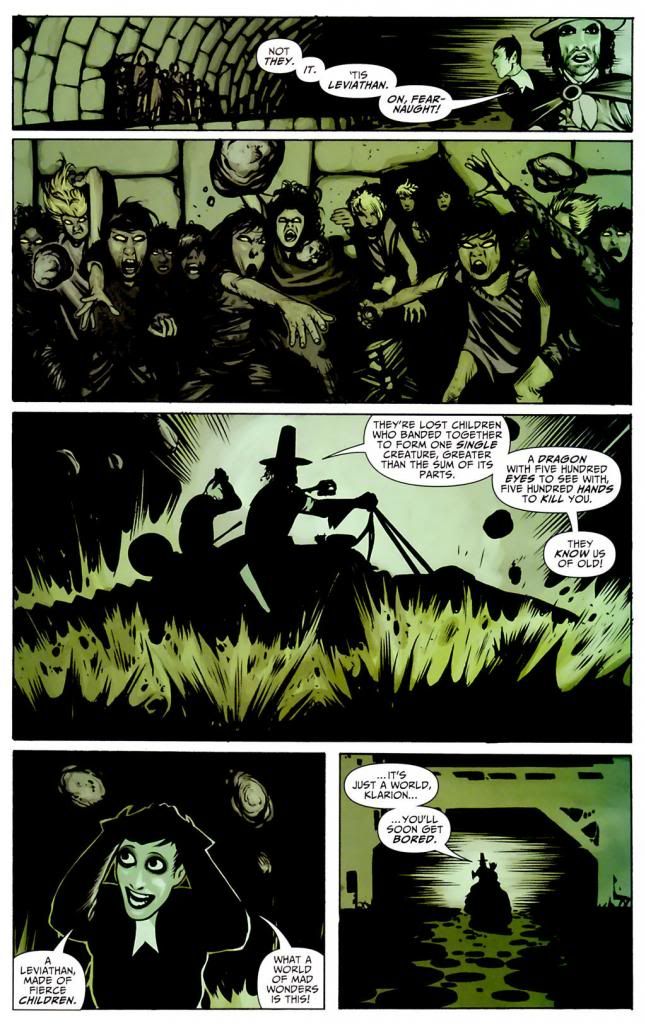 In regards to Mister Miracle, do I have the right idea that in the final issue he isn't actually one of the Seven Soldiers? Or rather, just at the climax when he dies he isn't able to fulfill his role but I, Spyder is able to step into essentially the void he left? Maybe he was never truly one of the Soldiers to begin with, his role is more a prequel to Final Crisis. Ruptured Yakety Sax fucked around with this message at 16:39 on Sep 18, 2014 |
|
|
|
Goatmask posted:In regards to Mister Miracle, do I have the right idea that in the final issue he isn't actually one of the Seven Soldiers? Or rather, just at the climax when he dies he isn't able to fulfill his role but I, Spyder is able to step into essentially the void he left? Maybe he was never truly one of the Soldiers to begin with, his role is more a prequel to Final Crisis. That's right, his last second reveal facilitates The Bulleteer's totally casual role in killing Gloriana. Shiloh escaping the Life Trap is pretty much a cliffhanger for Final Crisis; the first two thirds of all the Batman stuff seems like an elaborated version of what Shiloh went through.
|
|
|
|
I'm pretty sure Mister Miracle is one of the Soldiers, since the prophecy says that one of the Soldiers is going to die. His main contribution to the 'cause' is in trading his life for Aurakles' freedom. I'm not really clear on how Aurakles contributes to defeating the Sheeda, but he is connected in some ways, like how Bulleteer has his red hair in her last panel - because she is the 'spear of destiny' that Aurakles threw? Another cool detail I only noticed when I was rereading it: Bulleteer's car crashes because it clips the edge of Klarion's drill machine. If he hadn't parked it in just that spot, the prophecy wouldn't have been fulfilled.
|
|
|
|
Sailor Viy posted:I'm pretty sure Mister Miracle is one of the Soldiers, since the prophecy says that one of the Soldiers is going to die. Doesn't necessarily rule out I, Spyder though who after all was a reanimated zombie. Thanks to this thread I'm giving the series a reread and am really enjoying things. One thing I'm noticing is the blood motif that keeps popping up. "In the world of the super-cowboys, there’s always blood. Someone’s blood. On someone’s hands. There are always special destinies. Tales of loss and vengeance. Family obligations. Blood. Spilled or otherwise." Is there a more central idea behind this? It seems to be a broad motif, as I guess blood is. Blood as sacrifice, vengeance, violence, madness, life and family. There is, off the top of my head the poster for "The Cup of Blood" starring that mermaid, which I assume is a reference to the Holy Grail, especially as it appears in Shining Knight's mini. Shining Knight who has "the blood of a womb". Badde selling his "blood for liquor and baubles". Melmoth using his blood to give birth to Frankenstein, and who's blood flows through the Sheeda. On Mars "in a monstrous zodiac of spiller blood, vengeance must come". I feel like there are more I'm missing. edit: Manhattan Guardian being a cop who accidentally shot an unarmed kid sure does read a bit differently these days, huh. Ruptured Yakety Sax fucked around with this message at 09:55 on Sep 21, 2014 |
|
|
|
"Cop who feels guilt after accidentally killing a kid" is a staple of the hardboiled genre.
|
|
|
|
I'm pretty sure Klarion is the one who wasn't actually a Soldier.
|
|
|
|
Rand Brittain posted:I'm pretty sure Klarion is the one who wasn't actually a Soldier. "I think I'll stay a boy forever!"
|
|
|
|
Rand Brittain posted:I'm pretty sure Klarion is the one who wasn't actually a Soldier. Nah, he was important for stopping the Misty from taking over the Sheeda, keeping the whole cycle of violently raiding the past from continuing. Something Misty thought she would have no choice but to continue, and which he himself probably wouldn't do (if only for his presumably sheer ineptitude as a leader). Plus as mentioned above the position of his tunneling machine meant that when Bulleteer lost control of her car she accidentally plowed it straight into Gloriana. Something else that I have noticed is that each of the hero's have an origin story blood-sacrifice, of the Uncle Owen and Ma and Pa Wayne variety, which motivate their actions. I guess a similar line to the daddy issues mentioned in the OP. Manhattan Guardian has Larry. Klarion has his step-father, saving whom is what motivates him to leave through the gates out of Limbo Town. Less so his dad. Shining Knight has all of Camelot I guess. Zatanna has her mates at Baron Winter’s house, the latest in a long line of regrets and failings. And there is also the original regret, more central to her life; the death of her father. Bulleteer has her husband, Mister Miracle his brother. Frankenstein has the original Doctor F and later also Melmoth, although in keeping with his self-loathing and cynicism he's the one to do them in.
|
|
|
|
Oh crap! didn't notice this thread at all. I've been meaning to give Seven Soldiers a re-read for ages so, thanks to this, I might get started tonight. Need something to lure me away from Destiny addiction. One thing that struck me with my first read-through of it was the prevalence of the theme "how do we treat our creations". As listed in the OP there are a lot of different motifs used through the series but that is one of the big ones.
|
|
|
|
Oh hello, I didn't realize this thread existed. I really need to re-read Seven Soldiers now that Multiversity is happening. The collections sit in a special place on my shelves next to Planetary and the Fourth World Omnibuses. CloseFriend posted:Bulleteer's story serves to tell us, the readers, that if we want to make women feel like equals in comics, we need to give women greater control over comics. If we want a more equal society, then we need to give women more control over their own lives. I would agree. That's interesting in light of her final panel ("You're free." "Am I?"); I've always gone with the interpretation that she's aware of how she's "trapped" in the superhero narrative despite how much she hates it. But given how (even now 8 years later) nothing much has changed for female characters in mainstream comics. As a side note, was a solution to the crossword puzzle ever posted anywhere?
|
|
|
|
I love Seven Soldiers of Victory. The only part of I don't quite get is the Seven Unknown Men and their relationship to the series of events and the Sheeda. At one point it seems like they're the ones that thread teams of seven together to face the Sheeda, but then they're driven away and one of them is evil? Is Zor another agent of the sheeda?
|
|
|
|
Evil Mastermind posted:As a side note, was a solution to the crossword puzzle ever posted anywhere? Here we go: 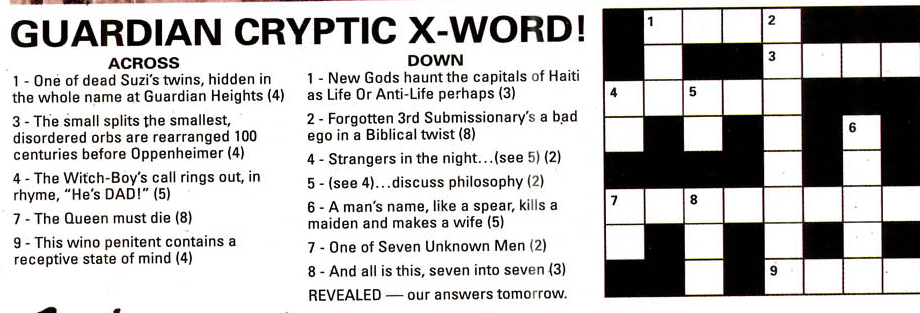 I don't have the books with me to look up some of these answers and don't have a clue about others. Like 9 across? Baby Brain? I've always been bad at this. Is 1 down Loa, the Haitian Voodoo spirits? Life Or Anti-Life. What is 6 down? Some are more obvious. 4 across for instance must be "Badde" - confirming that Badde was Klarions dad. FAT BATMAN posted:I love Seven Soldiers of Victory. The only part of I don't quite get is the Seven Unknown Men and their relationship to the series of events and the Sheeda. At one point it seems like they're the ones that thread teams of seven together to face the Sheeda, but then they're driven away and one of them is evil? Is Zor another agent of the sheeda? I've always viewed them as all being Grant Morrison, but representing all the authors and creators of comics. Supreme powers, stitching together the shared DC universe from patches of different stories. Whilst Zor with his magnificent beard represents the Alan Moore type, similar to Mandrax in Final Crisis, a more cynical power desiring to tell far more grim stories, without joy. No time for fun kids gangs in Watchman. Less so specifically Alan Moore, though Grant Morrison can't resist his pointed barbs, and more the movement he spawned. In the story the Unknown Men are all powerful entities controlling lives and destinies. The Eighth-of-Seven Zor rebels against them, creating the Sheeda to consume the past which is everything and destroy all that they have created. The Sheeda are some sort of commentary on the habit of creators to raid the past for story ideas to burn through? Whereas Seven Soldiers is about raiding the past to build on and create? Ruptured Yakety Sax fucked around with this message at 07:31 on Sep 27, 2014 |
|
|
|
Goatmask posted:Here we go: I'm guessing 3 across is "ATOM" and 8 down is "ONE"?
|
|
|
|
It's been solved. http://smg.photobucket.com/user/davidbird/media/SevenSoldiers1CrosswordResized.jpg.html (Pretty sure it's Bohr, not Bors, though? Or "Bomb")
|
|
|
|
d00gZ posted:It's been solved. Thank you so much. I've been looking for that for years. It's probably just me, but "One of the Seven Unknown Men" being GM is obviously Grant Morrison, but as a gamer my first read of that was Game Master and I started theorizing in a weird direction for about 5 seconds before I realized.
|
|
|
|
d00gZ posted:It's been solved. Bors the laughing knight splits the atom, iirc
|
|
|
|
I started rereading this the other day, and the prelude mini in JLA Classified is pretty confusing. I have to go through and read Morrison's Justice League run at some point, but the mini has a lot of weird stuff going on with Qeweq/Nebula Man. Why is the infant universe in Grodd's possession and on Pluto at the same time? Does it become Ne-Buh-Loh by infecting that one Ultramarine? He gets pulled into Qeweq but later shows up with a Sheeda rider on his back. Does the ultramarines going into Qeweq come up in Seven Soldiers at all? Also Grodd is super gross in this mini, but it's got some great moments- Batman's sci-fi closet and the all the stuff with Beryl.
|
|
|
|
Straight Outta CompUSA posted:I started rereading this the other day, and the prelude mini in JLA Classified is pretty confusing. I have to go through and read Morrison's Justice League run at some point, but the mini has a lot of weird stuff going on with Qeweq/Nebula Man. Not sure if i'm remembering accurately, but I recall a mention of a group of heroes who ventured into to Qeweq but failed to straighten it out.
|
|
|
|
Yeah, it isn't important. Hell, I don't think it's ever explained how the ultramarines get out Edit: I forgot it's implied the ultramarines doing good within qwewq is the reason the huntsman is "weak" enough to spare princess rhiannon/misty. Still, nothing critical. Scuba Trooper fucked around with this message at 04:17 on Sep 28, 2014 |
|
|
|
hup posted:Yeah, it isn't important. Hell, I don't think it's ever explained how the ultramarines get out Frankenstein specifically says that the reason he can beat nebuloh is because"supermen from this galaxy" invaded him and weakened him. I never read the JLA thing, so from my perspective it was weird that it was a relevant plot point.
|
|
|
|
Goatmask posted:
In an interview (don't remember where) Morrison says that the Seven Unknown Men correspond to seven DC writers who have appeared in their own comics. Morrison is obviously one since he has appeared in Animal Man and possibly others. He didn't say who the others were though.
|
|
|
|
You have no idea how happy this thread makes me. This was one of my favorite "events" ever. If I can't borrow a copy from a friend, I'm tempted to go out and pick up the trades. In the spirit, here's a Klarion wallpaper.  http://imgur.com/AW10Zfb
|
|
|
|
Seven Soldiers of Victory is sooooo good and is one of the few comic runs I've got the entire collection of in actual comics rather than TPBs (thinking about it, the only other run is Morrison's Animal Man). This series emphasises a lot of what is so good about Morrison. What other writer could or would even want to create seven new characters with their own supporting cast and backstory, each with a unique narrative tone, and make it all work so well? In an industry full of the likes of Geoff Johns - comic readers who have become comic writers and just want to retread the same ground as the comics they used to read - it is great to come across a character who can just throw an entire host of new characters and make them work. While it isn't as deep as a lot of his other work, if you're not a Morrison fan then that will mean it's a lot more comprehensible. At the most basic level, putting aside the meta narrative that draws them all together (which is itself spelled out towards the end), they are enjoyable tales taken simply at face value.
|
|
|
|
The Mister Miracle mini had obvious ties to Final Crisis, but I caught this on my last read in Zatanna #1  Also, the ultramarines can't catch a loving break
|
|
|
|
I just reread this trying to catch more details and whatnot in the context of this thread, but pretty much all of Mister Miracle's story was a giant question mark. Also, how did The Guardian contribute to the last fight? I couldn't figure that out.
|
|
|
|
|
Guardian rallied the people of New York to fight against the Sheeda. Mister Miracle's story was Morrison trying to make the events of the abysmally bad "Death of the New Gods" series into something useful/setup for Final Crisis.
|
|
|
|
Evil Mastermind posted:Mister Miracle's story was Morrison trying to make the events of the abysmally bad "Death of the New Gods" series into something useful/setup for Final Crisis. No it wasn't. Death of the New Gods came out a couple of years after Seven Soldiers. It was partially a set up for Final Crisis though.
|
|
|
|
Shameless posted:No it wasn't. Death of the New Gods came out a couple of years after Seven Soldiers. It was partially a set up for Final Crisis though. It did? I honestly thought it was the other way around since the whole thing with DotNG was that they all, well, died, and Mister Miracle was the aftermath. Then again, given how bad DotNG was, continuity placement was just the start of its problems. (Do not get me started on DotNG.) e: Huh. Seven Soldiers ended in December '06 and DotNG started in December '07. But that doesn't make sense; the New Gods being dead was one of the big plot points of Seven Soldiers! Dammit Starlin! Evil Mastermind fucked around with this message at 21:19 on Oct 20, 2014 |
|
|
|
Evil Mastermind posted:It did? I honestly thought it was the other way around since the whole thing with DotNG was that they all, well, died, and Mister Miracle was the aftermath. Wasn't that time-fuckery part of Morrison's story too, though? Darkseid died in his realm and fell back through space and time.
|
|
|
|

|
| # ? May 6, 2024 00:46 |
|
It is, but there's still parts of DotNG that don't mesh up with SS or Final Crisis (like how the Source is a person, how the Anti-Life Equation works, or the fact that New Genesis and Apokalypse get mashed together like clay to form the Fifth World). That being said, I'm going to stop derailing and go on blaming Starlin because I honestly hate that comic.
|
|
|


